Philippe Nolet
Professor of Applied Ecology and Forestry

819-595-3900 poste 2936
Research themes
Silviculture, regeneration, global changes, abiotic stress, mobile LiDAR, sugar maple, beech, tree growth, tree mortality.
Education
- 2011-2016 : PhD in Biology – Université du Québec à Montréal
- 1990-1993 : Master of Science – Environmental Sciences – Université du Québec à Montréal
- 1987-1990 : Bachelor of Science – Biology – Université du Québec à Montréal
Description of research
I am particularly interested in the effects of climate change and global change on forest ecosystems as well as the actions we can take to promote the resilience of the forest. As a result, I am interested in a number of very different aspects of forest management. I am particularly interested in the effects of repeated stress (drought, freeze-thaw events, insect outbreaks) on forest dynamics, mainly in temperate forests. I am also always on the lookout for innovative methods to carry out my projects.
-
add removeKey publications
- Nolet, P., Kneeshaw, D., Messier, C., Béland, M. 2018. Comparing the effects of even- and uneven-aged silviculture on ecological diversity and processes: A review. Ecology and Evolution, 8 (2), pp. 1217-1226.
- Nolet, P., Kneeshaw, D. 2018. Extreme events and subtle ecological effects: lessons from a long-term sugar maple–American beech comparison. Ecosphere, 9 (7), art. no. e02336.
- Roy, M.-È., Nolet, P. 2018. Early-stage of invasion by beech bark disease does not necessarily trigger American beech root sucker establishment in hardwood stands. Biological Invasions, 20 (11), pp. 3245-3254.
- Nolet, P., Delagrange, S., Bannon, K., Messier, C., Kneeshaw, D. 2015. Liming has a limited effect on sugar maple – American beech dynamics compared with beech sapling elimination and canopy opening. Canadian Journal of Forest Research, 45 (10), pp. 1376-1386.
- Nolet, P., Doyon, F., Messier, C. 2014. A new silvicultural approach to the management of uneven-aged Northern hardwoods: Frequent low-intensity harvesting. Forestry, 87 (1), pp. 39-48.
-
add removeProjects
Effect of management method on forest resistance to repeated stress
Forests around the world are managed using two main methods: the uneven-aged method, which consists of carrying out repeated partial harvests, and the even-aged method, which usually includes a final cut (clear-cut). Uneven-aged silviculture is increasingly favoured probably because it is less drastic and because it is more socially acceptable. Also, in a context of global change, where forests are undergoing various repeated stress, the uneven-aged method of management is preferable to even-aged management. The aim of this project is to determine whether the uneven-aged forests have been more resistant to stress in recent years than those managed under even-aged conditions. We have developed an inventory methodology using a mobile terrestrial LiDAR. This approach will enable us to map thousands of trees (dead and alive) and to determine if the probability of tree mortality varies according to the management method, taking into account a number of factors (species, diameter competition, etc.)
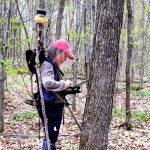
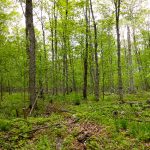
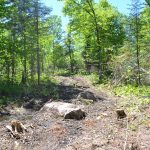
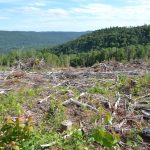
Response of trees to adaptive silviculture treatments in multistressor context
Foresters are looking for new approaches to take into account global changes. One of the theoretical frameworks that seems to be the most popular is that of Millar et al. (2007) which is based on the concepts of resistance, resilience and facilitation. Although there are some studies that seem to show that silvicultural thinning can promote the growth (resistance) of residual stems, few studies have shown that silviculture is an effective tool for promoting the adaptation of forests to global changes. It is therefore important to test the theoretical framework proposed by Millar et al. (2007) and this is what we will try to do in this project by focusing on the aspects of resistance and resilience. We will consider that the mature trees of a forest stand constitute the resistance material of the forest ecosystem while the regeneration potential is the material for the resilience of the forest ecosystem. This regeneration potential can be updated (sapling, sowing) or not (flowers, seeds, vegetative reproduction). Resistance-resiliency can therefore be considered as a continuum. Since a variety of processes (growth, survival, competition, etc.) are involved in the response of the ecosystem to given stresses and these processes are activated differently depending on, among other things, species, stages of development, and the stresses that the ecosystem suffers. Our general hypothesis is that silvicultural treatments will have contrasting effects depending on the stress undergone and depending on whether the effect is considered to be on resistance or resilience. This hypothesis will be verified using a combination of various stresses and silvicultural treatments.
The resilience of temperate forests to water stress: a study of stress memory or priming in forest species
In trees, drought can cause embolisms created by cavitation, and can have irreversible effects on the xylem’s ability to transport water. As a result, plants prone to repeated drought events may develop resistance mechanisms or may experience a decline in their vigor and survival potential. Stress memory in plants, otherwise known as priming, has been suggested as being analogous to the animal immune system. Priming is then described as a memory of a stress following a first exposure involving genetic and / or biochemical modifications of the plant. This memory then makes it possible, during a second exposure to stress, to initiate a stronger and / or faster defensive response. The storage of stress memory seems to act under various mechanisms such as the synthesis of transcription factors and signal proteins. Therefore, in our efforts to improve the silvicultural management of temperate forests, the aim of this project is to study stress memory in different forest species undergoing repeated drought events. The aim would then be to prioritize the planting of the most resilient species, and to better understand the underlying mechanisms of priming in these species.
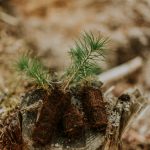
Relative importance of silvicultural treatments, white-tailed deer, competition and abiotic factors on the medium-term response of regeneration and plant diversity in the temperate forest.
In response to the problems of regeneration of some species of the temperate forest, silvicultural treatments were developed in the 1990s, and a large number of experiments were established by various groups of researchers. These experiments have made it possible to better understand the effect of silvicultural treatments on the successful establishment of regeneration of a desired species in the short-term, and have been the source of a very large number of scientific publications; however, few results have been published on the medium- and long-term effects (10-20 years) of these treatments on regeneration. In a context of global changes, the interaction between various factors, such as herbivory, competing vegetation and extreme weather events, also complicates our ability to predict the effects of silvicultural treatments on regeneration. Thus, this project aims, through the remeasurement of a set of existing variables at the Quebec scale, to draw a provincial portrait of the medium- and long-term effects of a variety of regeneration processes on regeneration success and plant biodiversity. This remeasurement of a set of variables also aims to evaluate the relative importance of the various factors mentioned above and their interactions on regeneration. Finally, this project aims to better understand and model the effects of extreme climatic factors (expanding with climate change) and competition on the dynamics and composition of forest regeneration through the implementation of complementary experiments. All this knowledge will enable forest managers to better target regeneration efforts and assess whether they represent the best possible investment.

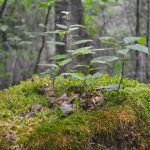
-
add removeStudents and postdoctoral fellows
Étudiants actuels
Stagiaires postdoctoraux
Doctorat
Maîtrise
-
add removeAvailable projects (coming soon)
arrow_backBack to Team
